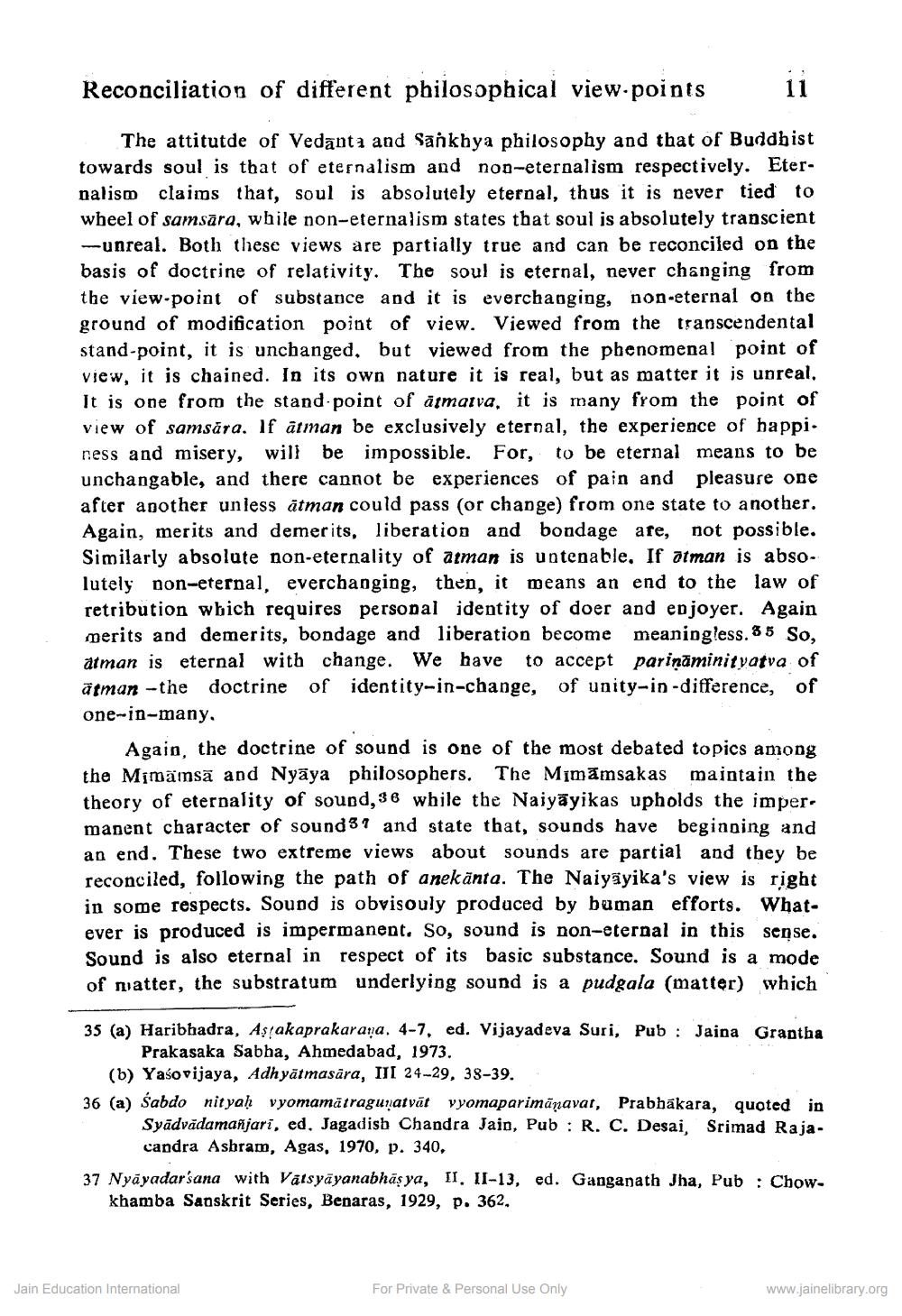________________
Reconciliation of different philosophical view-points
11
The attitutde of Vedanta and Sankhya philosophy and that of Buddhist towards soul is that of eternalism and non-eternalism respectively. Eternalism claims that, soul is absolutely eternal, thus it is never tied to wheel of samsara, while non-eternalism states that soul is absolutely transcient -unreal. Both these views are partially true and can be reconciled on the basis of doctrine of relativity. The soul is eternal, never changing from the view-point of substance and it is everchanging, non-eternal on the ground of modification point of view. Viewed from the transcendental stand-point, it is unchanged, but viewed from the phenomenal point of view, it is chained. In its own nature it is real, but as matter it is unreal. It is one from the stand point of atmatva, it is many from the point of view of samsăra. If atman be exclusively eternal, the experience of happiness and misery, will be impossible. For, to be eternal means to be unchangable, and there cannot be experiences of pain and pleasure one after another unless atman could pass (or change) from one state to another. Again, merits and demerits, liberation and bondage are, not possible. Similarly absolute non-eternality of atman is untenable. If atman is absolutely non-eternal, everchanging, then, it means an end to the law of retribution which requires personal identity of doer and enjoyer. Again merits and demerits, bondage and liberation become meaningless. 35 So, atman is eternal with change. We have to accept pariṇāminityatva of atman -the doctrine of identity-in-change, of unity-in-difference, of
one-in-many,
Again, the doctrine of sound is one of the most debated topics among the Mimamsa and Nyaya philosophers. The Mimamsakas maintain the theory of eternality of sound, 36 while the Naiyayikas upholds the impermanent character of sound 37 and state that, sounds have beginning and an end. These two extreme views about sounds are partial and they be reconciled, following the path of anekanta. The Naiyayika's view is right in some respects. Sound is obvisouly produced by buman efforts. Whatever is produced is impermanent. So, sound is non-eternal in this sense. Sound is also eternal in respect of its basic substance. Sound is a mode of matter, the substratum underlying sound is a pudgala (matter) which
35 (a) Haribhadra, Aşṭakaprakaraya, 4-7, ed. Vijayadeva Suri, Pub Jaina Grantha Prakasaka Sabha, Ahmedabad, 1973.
(b) Yasovijaya, Adhyātmasāra, III 24-29, 38-39.
36 (a) Sabdo nityaḥ vyomamätraguṇatvāt vyomaparimāṇavat, Prabhakara, quoted in Syadvadamañjarī, ed. Jagadish Chandra Jain, Pub R. C. Desai, Srimad Rajacandra Ashram, Agas, 1970, p. 340,
37 Nyayadar'sana with Vatsyayanabhāṣya, II. II-13, ed. Ganganath Jha, Pub Chowkhamba Sanskrit Series, Benaras, 1929, p. 362.
Jain Education International
For Private & Personal Use Only
www.jainelibrary.org




